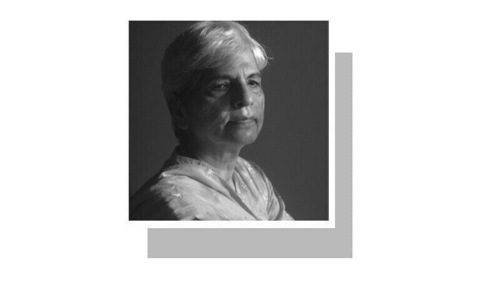KARACHI: A novel titled Gambit on the Devil’s Chessboard by Dr Imran H Khan was launched at a local hotel on Saturday evening.
Pakistan Peoples Party leader and former Senate chairman Senator Mian Raza Rabbani, the chief guest on the occasion, said for the last couple of days his host [of the launch] had been trying to create an illusion or delusion that book reading and writing is something which is top priority in Pakistan.
“But I think the way Javed Jabbar [who spoke earlier about the author being a doctor living abroad] gave examples of Pakistanis that wrote books with the common factor that they live abroad. This goes to show that the Pakistani state itself decided that the coffee house culture that existed in the country — which generated thought, thesis and counter thesis, intellectuals — needed to be brought to an end.
“The Zia era was the most responsible to end that culture. After that what we have seen is that there exists no academic freedom in Pakistan. Dissent is something that’s not to be tolerated as a result of which we are unable to produce people such as Jaun Elia, Habib Jalib and Rais Amrohvi.
Gambit on the Devil’s Chessboard launched
“The book is a breath of fresh air in the circumstances that we find ourselves in. I personally believe it to be [a book of] fictional reality. There is a great deal of similarity between this fictional reality and my own two books — The Smile Snatchers and Invisible People — because the situations and characters are real, only their names are fictitious. In the book, I can relate to Operation Shangri La, I can relate to the description of torture, rice pudding, and relate to the conversation between the chief of army staff-designate and the prime minister.
“When you look at the book, as has been said by speakers before me, there is a striking similarity between situations and characters we find in Pakistan at present... The book portrays goodie goodie western capitalists looking for an opportunity to help the downtrodden and oppressed people in Third World countries. But in reality, it is this new form of colonialism, neocolonialism whereby the resources of Third World countries are exploited by them,” he said.
Former federal minister Javed Jabbar said most novels tend to move at the speed of 70 to 80 miles per hour, but Mr Khan’s starts at 140 miles per hour and never slows down, maintaining relentless, frenetic, breakneck speed. One has to pay a price if one wants to maintain such a speed. “It’s a pictorial novel without pictures, full of dialogue. Its language is austere, precise, neat, perhaps too neat, no scope for shades and no time to explore nuances.”
He gave the author the advice to turn his publication into an audio book since it’s easy on the tongue and easy to hear. “It has an imaginative plot, intricate, full of twists and turns.”
The other advice that the former senator put forward was to come up with a sequel to the book.
The author of the novel, Imran H Khan, said when he set out to write the book there were several ideas spinning in his head. He first thought of writing nonfiction but it didn’t work out; then he began writing it as a novel.
“I had already written my 15th draft and thought to myself it’s very easy. After the 15th draft, I gave the manuscript to the father of the director of the cancer centre [where he works] who is a literary person. He replied that it was interesting but it didn’t read like fiction. So I went to my mentor, writer Jerry Jenkins, and took a six-month class with him, and that really helped me,” he said.
Prof Kaleem Raza Khan said he’d read the book twice, once as a critic, and then as a reader. He liked it as a reader. The author’s use of metaphors is praiseworthy.
Dr Huma Baqai said fact is stranger than fiction but when you create fiction, which is grounded in facts, then the result is spectacular. “The book will resonate with each one of us because it’s close to reality.”
Senior journalist Muhammad Ali Siddiqi talked about the importance of ‘ambience’ in a novel. He added that the novel tells the story through dialogue that takes place in different multinational companies.
Calling the book ‘engaging’, Ameena Saiyid said she was given the novel to read two weeks ago but she finished reading it in three days. “I couldn’t put it down, it’s so fast paced, it resonated with me.”
Faisal Siddiqi and Abid Azhar also spoke.
Published in Dawn, December 25th, 2022













































